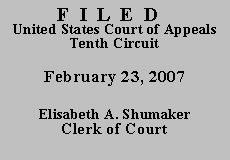

| UNITED STATES OF AMERICA,
Plaintiff-Appellee, v. TERRY BENNETT WILLIAMSON, Defendant-Appellant. |
|
Despite this appeal waiver, defendant filed a notice of appeal. The government has moved to enforce his appeal waiver under United States v. Hahn, 359 F.3d 1315 (10th Cir. 2004) (en banc) (per curiam). Under Hahn, we will enforce a criminal defendant's waiver of his right to appeal so long as (1) "the disputed appeal falls within the scope of the waiver of appellate rights"; (2) "the defendant knowingly and voluntarily waived his appellate rights"; and (3) "enforcing the waiver would [not] result in a miscarriage of justice." Id. at 1325, 1327. The miscarriage-of-justice prong requires the defendant to show (a) his sentence relied on an impermissible factor such as race; (b) ineffective assistance of counsel in connection with the negotiation of the appeal waiver rendered the waiver invalid; (c) his sentence exceeded the statutory maximum; or (d) his appeal waiver is otherwise unlawful. Id. at 1327. The government's motion addresses all of these considerations, explaining why none of them undermine defendant's appeal waiver. Upon review of the pertinent plea and sentencing materials, we agree.
Defendant argues as a threshold matter that the government's motion to enforce is untimely under 10th Cir. R. 27.2(A)(3), which provides that such motions "must be filed within 15 days after the notice of appeal is filed." The cited rule allows for late filing "upon a showing of good cause," and we conclude that cause has been shown for the delayed filing here.
Next, defendant contends that his appeal falls outside the scope of his appeal waiver and that enforcing the appeal waiver would be a miscarriage of justice because the sentence imposed was unreasonable under United States v. Booker, 543 U.S. 220 (2005). In support of this claim, he asserts that the district court should not have ruled that he is a career criminal under the advisory sentencing guidelines because his two prior drug convictions were related offenses. He further argues that his appeal waiver was unknowing because he did not agree to be unreasonably sentenced. None of his contentions have merit.
The issue that defendant seeks to appeal falls squarely within the specific appellate waiver, which prohibits an appeal of "any sentence within the statutory maximum authorized by law." Plea Agreement at 5. The plea agreement clearly set out the maximum sentence defendant faced and explained the appellate rights he relinquished in exchange for the benefits offered by the government.
As to his miscarriage-of-justice claim that his appeal waiver was otherwise unlawful, defendant must show that the error "seriously affect[s] the fairness, integrity or public reputation of judicial proceedings." Hahn, 359 F.3d at 1327 (quotation omitted and alteration made). Defendant's arguments do not support the miscarriage-of-justice exception because his claims only concern the lawfulness of his sentence; he has not asserted any claim regarding the critical issue of whether his appeal waiver was itself unlawful. See United States v. Porter, 405 F.3d 1136, 1144 (10th Cir.), cert. denied, 126 S. Ct. 550 (2005) ("The relevant question . . . is not whether [defendant's] sentence is unlawful . . . , but whether . . . his appeal waiver itself [is] unenforceable."); see also Hahn, 359 F.3d at 1326 & n.12 (discussing knowing and voluntary prong and recognizing "the logical failings of focusing on the result of a proceeding, rather than on the right relinquished, in analyzing whether an appeal is unknowing or involuntary"). Indeed, to hold that alleged errors under the sentencing guidelines render an appeal waiver unlawful would nullify the waiver based on the very sort of claim it was intended to waive. Nor has defendant otherwise shown that enforcement of the waiver would seriously affect the fairness, integrity, or public reputation of the judicial proceedings.
Further, as to defendant's argument that his waiver was unknowing, this court has "consistently and repeatedly held that broad [appeal] waivers are enforceable even where they are not contingent on the ultimate sentence falling within an identified sentencing range." United States v. Montano, 472 F. 3d 1202, 1205 (10th Cir. 2007) (citing cases and expressly declining to adopt a rule that an appeal waiver is unenforceable where defendant did not know at the time she entered the plea agreement what her sentencing range would be and that the resulting sentence was greater than anticipated). The sentence imposed by the district court complied with the terms of the plea agreement and with the understanding of the plea that defendant expressed at the plea hearing. Defendant has not demonstrated that his appeal falls outside the scope of the appeal waiver, that he did not knowingly and voluntarily agree to the appeal waiver or that it would be a miscarriage of justice to enforce the waiver.
Accordingly, the government's motion to enforce the waiver is GRANTED and the appeal is DISMISSED. The mandate shall issue forthwith.
ENTERED FOR THE COURT
PER CURIAM
*. This panel has determined unanimously that oral argument would not materially assist the determination of this appeal. See Fed. R. App. P. 34(a)(2); 10th Cir. R. 34.1(G). The case is therefore ordered submitted without oral argument. This order and judgment is not binding precedent, except under the doctrines of law of the case, res judicata, and collateral estoppel. It may be cited, however, for its persuasive value consistent with Fed. R. App. P. 32.1 and 10th Cir. R. 32.1.